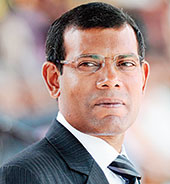
Nasheed
New Delhi, March 14: A Maldives court's late night order sentencing former President Mohammed Nasheed to 13 years in jail is threatening to push India's ties with the tiny nation to the brink at a time New Delhi has tried to avoid alienating Male despite deepening tensions.
Nasheed has been convicted of terrorism for ordering the detention of an allegedly corrupt judge in 2012 when he was still President, the country's first to be democratically elected.
Last night's sentencing, coming at a time Prime Minister Narendra Modi was visiting neighbouring Indian Ocean islands, triggered a sharp response from New Delhi.
India has for the past few years harboured concerns that instability in the Maldives has been facilitating anti-India groups there. China too has increasingly focused on the Maldives, with President Xi Jinping visiting the country last year -- the first Chinese President to do so.
'We are deeply concerned over the developments in the Maldives,' external affairs ministry spokesperson Syed Akbaruddin said. 'We are monitoring the situation there.'
Nasheed's conviction was not unexpected. The trial has widely been viewed as politically driven, both inside and outside the Maldives, at a time current President Abdulla Yameen's ruling coalition is falling apart.
But the speed of the trial, the quick conviction and the Yameen government's refusal to avoid deepening the political crisis in the Maldives has left Indian officials scrambling to evolve a strategy to pressure Male.
India had criticised Nasheed's arrest in late February, especially pointing to concerns at the way he had been 'manhandled' by police officers. The US, Canada, United Nations and the Commonwealth too had articulated concern over Nasheed's arrest.
Maldives foreign minister Dunya Maumoon -- niece of Yameen and daughter of long-time ruler Maumoon Abdul Gayoom -- had hit back at the criticism, asserting that the Male government 'will not take instructions from any foreign government.'
Till now, India has chosen to ignore the snub, instead balancing its public symbolism with quieter gestures meant to communicate that while New Delhi was uncomfortable with Nasheed's arrest, it wasn't planning to treat the Maldives as a pariah.
For public consumption, Modi pulled out of a scheduled visit to the Maldives -- he was to have travelled to Male from Colombo tomorrow. India had warned the Maldives earlier about the possibility of Modi cancelling the trip unless Nasheed was assured a fair trial.
But yesterday, hours before Nasheed's conviction, India also sent a navy ship -- the INS Gomati -- on a planned visit to assist the Maldives National Defence Force on a joint surveillance patrol of the Maldives' exclusive economic zone.
That tough balance, officials said, will be harder to maintain with Nasheed's quick conviction.
'It's almost as though the Maldives is deliberately provoking us,' a senior Indian official said.
Not doing more to assert its views on the Maldives runs a risk the Modi government should be familiar with -- the BJP had accused the Manmohan Singh government of weakness when it tried to avoid muscular action against smaller neighbours like the Maldives.
Nasheed, who left office in 2012 claiming he had been unseated unconstitutionally, issued an emotional statement last night to the people of the Maldives as he stood in court after the conviction.
'I appeal to all of you today to stay courageous and strong; to confront the dictatorial power of this regime,' Nasheed said, virtually calling for civil disobedience.
'To change this government and work towards forming a government that would pave the way for the people's development and prosperity.'










